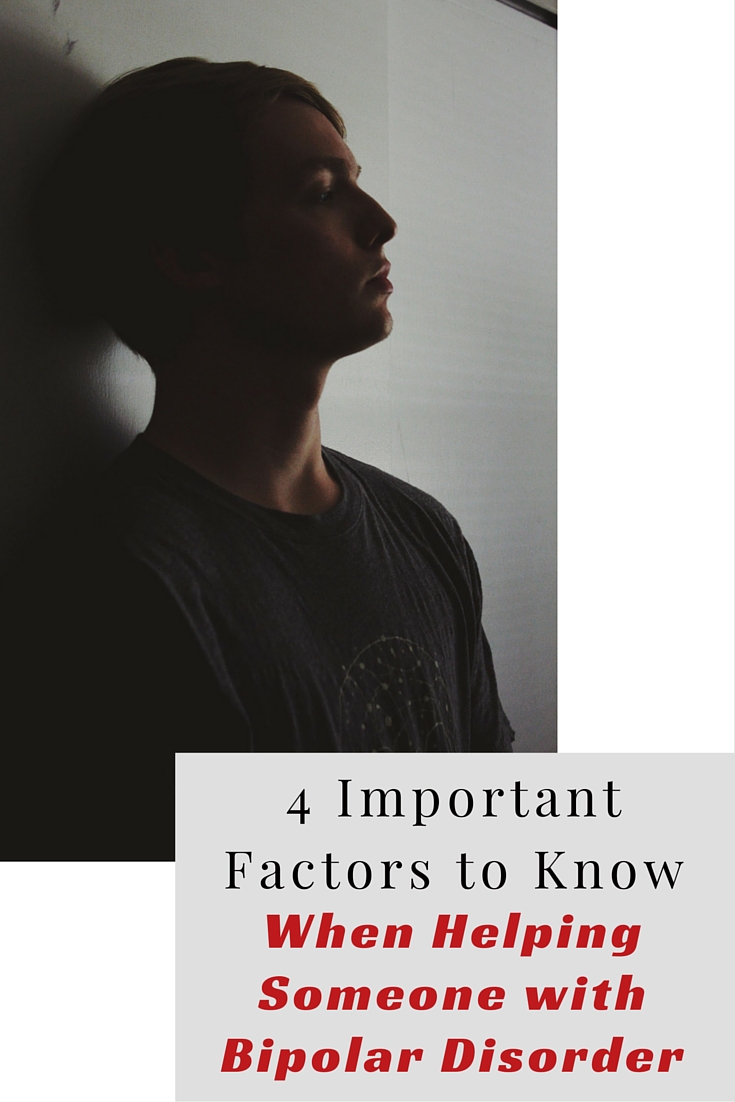The following is a guest post from Steve Johnson.

As any parent of a child with bipolar disorder knows, things are rarely easy, but it’s important to recognize potential dangers that come along with it so you can prevent things from escalating out of control. Bipolar disorder is a mood disorder that is characterized by extreme mood swings that are so severe they disrupt a person’s daily life. Nearly 3% of Americans are living with bipolar disorder, and symptoms include “alternating between periods of elevated mood (mania or hypomania) and periods of depression.”
People who have bipolar disorder feel so energetic and abnormally happy that they may make reckless decisions, while they may feel hopeless, overwhelmed, and extremely negative when they experience a depressive state.
If you are a parent of someone who battles bipolar disorder, there are a few important factors to know so that you can help him/her navigate life with this mood disorder more successfully.
4 Important Factors to Know When Helping Someone with Bipolar Disorder
1. Depressive episodes can lead to suicide
Depressive episodes are characteristic of bipolar disorder. Major depressive episodes include five or more symptoms, which occur mostly uninterrupted for at least two weeks*:
- a pervasive depressed mood that affects daily life
- a limited ability to get pleasure from normal activities
- appetite changes that may result in weight loss or weight gain
- sleep changes
- difficulty sitting still or moving
- constant complaints of fatigue or low energy
- feeling worthless, guilty
- or ashamed
- having difficulty concentrating
- and suicidal thoughts.
Research shows that 25%-50% of people with bipolar disorder attempt suicide. The majority of people who suffer from bipolar disorder attempt suicide after the onset of the disorder, but medication and mood-stabilizing drugs keep the depressive episodes in check and limit suicidal thoughts.
That’s why it is critical for people struggling with bipolar disorder to regularly see a professional and remain on their treatment.
2. Manic episodes are disruptive and potentially dangerous
Manic episodes occur when a person with bipolar disorder experiences an abnormal state of an elevated or irritable mood for at least seven days*.
Typically, manic episodes are driven by behavior focused on achieving a goal or persistent energy. When a bipolar person is manic, he/she is overly happy and outgoing and may behave recklessly, and make poor decisions.
Manic episodes negatively affect relationships in many ways. Loved ones may not understand the choices and decisions the person with bipolar disorder makes while in the throes of the manic period.
If your child is struggling with coping during a manic episode, you should help him/her receive support from a psychiatrist, counselor, social worker or other mental health provider.
A medical professional may prescribe medication to treat an acute manic episode. Long-term treatment with mood stabilizers also is common for people with bipolar disorder, and it is important that they stay on their treatment and avoid triggers that make manic episodes worse. *Note from Michelle: Not everyone will experience episodes lasting predetermined periods of time. That's what's in the DSMV, but my kids can cycle through moods in a matter of minutes or hours. Every individual is different.
3. Maintaining a schedule and having structure is critical to those living with bipolar disorder
People with bipolar disorder better maintain stability when they have a routine. Sticking to a schedule and having structure in their life limits unexpected stressors and triggers.
One therapy for bipolar disorder, Interpersonal and Social Rhythm Therapy, helps those with bipolar disorder identify and maintain daily routines and emphasizes sleep routines to eliminate sleep deprivation, one of the biggest triggers for manic episodes.
Work and activities also help people battling bipolar disorder to establish structure in their daily lives.
4. Alcohol and drugs do not mix well with bipolar disorder
For anyone with a mental illness, drugs and alcohol pose increased risks because they contain mind-altering chemicals that affect the brain.
First, people who do not have a mental illness experience highs and lows when they experiment with recreational and illegal substances, and those highs and lows are enhanced for people living with bipolar disorder.
Individuals who struggle with bipolar disorder also have an increased risk of becoming addicted to drugs and alcohol because they engage in riskier behavior when they experience manic episodes.
Research shows that people with bipolar disorder are three times more likely to develop alcohol abuse or dependence, and one study found that 46% of patients with bipolar disorder had abused alcohol or were dependent on alcohol, and 41% had abused drugs or were dependent on drugs.
If you are trying to support a child living with bipolar disorder, it is important to be armed with information so you are in a better position to help. These four factors are a good place to start.
Want to see more posts about mental health? Subscribe here to have them delivered to your inbox each week!
Steve Johnson has always been dedicated to promoting health and wellness in all aspects of life. Studying in the medical field has shown him how important it is for reputable health-related facts, figures, tips, and other guidance to be readily available to the public. He created PublicHealthLibrary.org with a fellow student to act as a resource for people’s overall health inquiries and as an accurate and extensive source of health information. When he isn’t hard at work in his studies, Steve enjoys playing tennis and listening to his vintage record collection.
Image via Pixabay by Foundry



Post a Comment
Join the conversation!